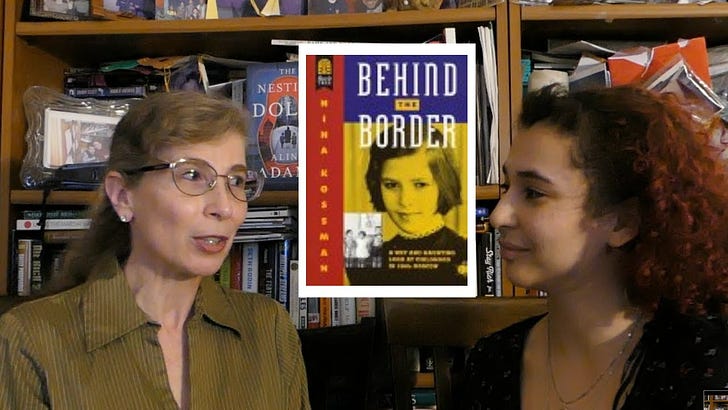Learning that Saturday, October 19, 2024 is a Freedom To Read Day of Action where “libraries, bookstores, readers, and other partners nationwide are hosting rallies and community events to unite against book bans and demonstrate our shared commitment to this fundamental freedom,” made me think about how, in my upcoming May 2025 novel, “Go On Pretending” (full disclosure: Most things make me think of my upcoming May 2025 novel, “Go On Pretending,”), my heroine, Emma, gets a lesson in American censorship and its consequences.
The set up: Born and raised in the USSR as the biracial daughter of two high profile American defectors, Emma moves to New York City at the height of glasnost with her husband, Dennis, when he is hired to host a television show to explain the Soviet Union to US viewers. There, the two are warmly embraced by their fellow travelers. Who prove to be very different from what Emma expected.
The Scene: The elevator doors opened into a narrow, mirrored foyer with a coat rack. A second door led straight into the duplex. In a two-steps-down sunken living room, what looked to be over one hundred people in a variety of tuxedos, sports jackets, gowns and cocktail dresses mingled from buffet table to full-service bar. Sunset through the twelfth floor windows overlooking the Hudson River bounced off the crystal chandelier and the assortment of diamond jewelry, not to mention the guests’ flawless, sparkling teeth.
“This,” Emma whispered in Dennis’ ear, “is the Socialist Workers Party of New York?”
“You don’t recognize the oppressed masses when you see them?” he marveled, before smoothly turning, arms outstretched to heartily shake hand and elbow, in the American politician style, of the man stepping forward to greet them. “Emma, I do not think you’ve met. This is Larry. He owns the network which broadcasts my program. Larry, this is my wife, Emma.”
“It’s a pleasure to meet you,” Emma said to the man who owned the means of production at a Socialist workers meeting.
“Your husband is doing terrific work. His first show ranked third overall for the week. We can’t wait to see what he comes up with next!”
“That is very kind of you,” Emma said to the man at the Socialist workers meetings who was raking in advertising revenue based on her husband’s labor. Though Dennis’ actual show had no commercials – Soviet Central Television had insisted on it – there were ads at the beginning and at the end – Soviet Central Television had insisted on splitting the profits.
“You’re Emma Cain, aren’t you?” A woman stepped up to discreetly pull her aside while Dennis and Larry continued discussing how wonderful it was that they were getting the word out about labor uprisings around the globe. One of the first things Dennis had told Emma about his new employer was that while the majority of NYC’s television workers were unionized, Larry had managed to get an exception so that his didn’t need to be.
“I wrote my Master’s thesis at Barnard about your parents,” the woman trilled.
“Then you must know more about them than I do,” Emma replied sincerely.
It triggered a twitter of merriment in response.
“I focused on the repressive racial climate of 1950s America which made it impossible for your parents to stage their Othello here, and why they had no option but to immigrate to the USSR in order to achieve their full artistic expression. I can’t imagine how wonderful it must be for them to perform without fear of reactionary backlash, like in our commercial sphere.”
“Yes, they couldn’t stage Othello the way they wanted to in America in 1957.”
“Would you believe the United States is still banning works of art they don’t agree with? This wonderful little Canadian film, If You Love This Planet – it urges nuclear disarmament for the US and the Soviet Union, it advocates for peace, what could be controversial about that? – this lovely little film was banned by the Canadian Broadcasting corporation, and the US called it foreign political propaganda! Only the London Socialist Film Co-op was brave enough to screen it! Why, if it hadn’t won the Academy Award for Best Documentary Short a few years back, no one would have even known it existed!”
“A movie banned in America won an American movie award?” Emma double-checked.
“Yes! When the director accepted it, she thanked Ronald Regan for the extra publicity his condemning it had gotten her. Isn’t that absolutely radical?”
“What happened to the director?” Emma wondered how long US prison terms for such infractions were. A data point Dennis, and she as his wife, would be well-advised to calculate into all their decisions moving forward.
“Oh, don’t worry. She just finished a film about women anti-war activists and she’s shooting a new one about the nuclear age. She’s a warrior like your parents. She won’t let American Fascist repression stop her.”
***
And speaking of Soviets and books and Cold War propaganda, my daughter and I discuss: Behind the Border - click to watch now!



What a fun conversation with your daughter!